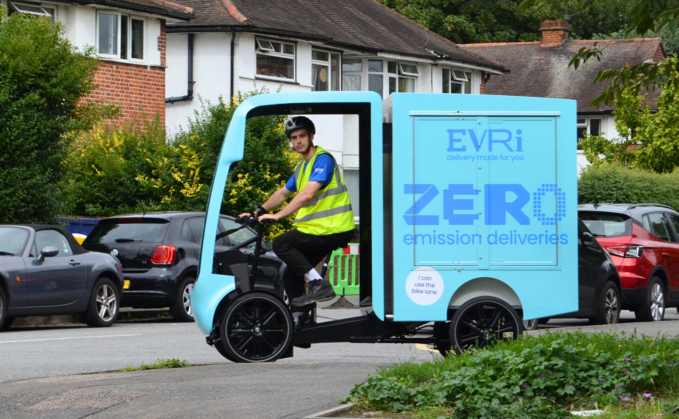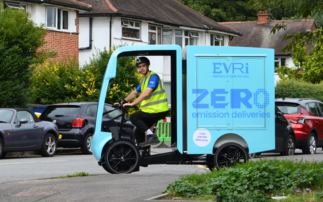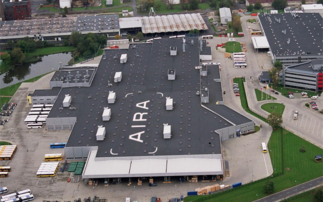Credit: Evri
Delivery giant sets out roadmap to deploy 3,000 e-cargo bikes in a decade while growing EV fleet to 270 vehicles over the next year
Evri has delivered a £19m boost to the emerging e-cargo bike market, having yesterday unveiled plans to invest in rolling out 3,000 of the electric delivery bikes over the course of the next decade.
The delivery giant said the investment would see it triple its fleet of e-cargo bikes from 33 to 99 while growing its electric vehicle (EV) fleet from 168 to 270 over the next year.
Evri said it then aimed to continue expanding its electric fleet towards deploying 3,000 e-cargo bikes over the next decade, as part of its effort to become a net zero emission company by 2035.
To fast-track these efforts, Evri said it had established a dedicated "final-mile electrification taskforce" to spearhead innovative solutions, explore partnerships, and implement strategies to transform its last-mile deliveries into a zero-emission operation.
Evri already operates e-cargo bikes in London, Bristol, Oxford, and Cambridge, where it claims to be delivering 1.5 million parcels by bike or EV, a small but significant chunk of its total 720 million deliveries each year.
However, Evri said it is now aiming to triple its present number of electric deliveries in the UK to around four million over the next year.
Each of its e-cargo bikes boasts a carrying capacity of around 2,000 litres, meaning it can deliver around 110 parcels in one go, according to the company. It estimated a single parcel delivery by e-cargo bike could therefore produce up a carbon saving of up to 250g.
As such, Evri estimated delivering four million parcels a year by e-cargo bike could save equivalent carbon emissions to those generated by driving over 400,000 miles, while also reducing air and noise pollution and helping with congestion on the roads.
The announcement came as Evri also published its latest ESG report, confirming it emitted 370g of CO2 per parcel on average during the past financial year, marking a 21 per cent drop year-on-year.
"Pedal power will rev up our efforts to reimagine parcel deliveries in the UK as we aim to become the biggest operator of e-cargo bikes in the sector," said Evri CEO Martijn De Lange. "We achieved a nine per cent decrease in carbon emissions since last year. The £19m investment announced today will lay the groundwork for Evri to dial up on its ambition to become the UK's most sustainable parcel carrier."
The company also plans to replace diesel vehicles used for its ParcelShop and SME collection routes by adding 148 EVs to its fleet in time for its busy Christmas period this year, it said. Moreover, a further 122 EVs are slated to join the fleet in spring 2025. The commitments would see electric vans account for over half of Evri's ParcelShop drop-offs and collections, it estimated.
To support these vehicles Evri said it would also continue expand the rollout of its own EV charging infrastructure backed by £1m investment across its depot network and hubs.
The announcement builds on Evri's previous investment in renewable bio-methane compressed gas, which now fuels more than half its first-mile fleet, and helps to reduce carbon emissions by up to 84 per cent, it said. The company also uses alternative fuels, such as hydrotreated vegetable oil (HVO), as standard at its depot in Brooklands.
"Evri is committed to making a positive impact on the environment and delivering a sustainable future," said Pauline Potter, director of procurement and sustainability at Evri. "Our multi-year ESG plans represent a significant leap forward, and we are confident that these initiatives will propel us towards our net zero goal.
"We are not just investing in technology, but also in our people, empowering them to be part of the solution. Together, we can build a more sustainable future for the parcel delivery industry, as well as the communities we serve."
Want to understand what is going on at the cutting edge of sustainability? Check out BusinessGreen Intelligence - the premier information for professionals focused on the UK's green economy.









